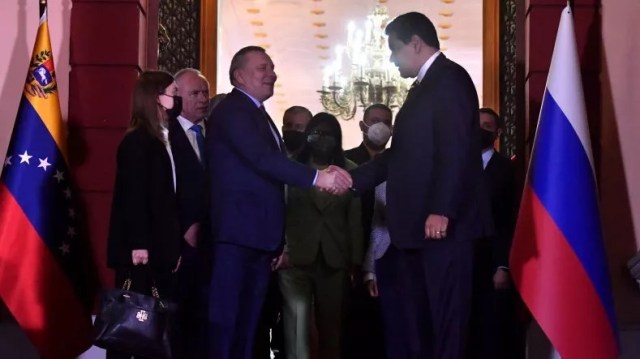
Venezuelan President Nicolás Maduro has declared a deepening of his country’s military ties with Russia after a visit by Moscow’s deputy premier who is next set to travel to Nicaragua and Cuba on a tour of friendly leftist-led Western Hemisphere states amid tensions with the United States over Ukraine.
By Newsweek – Tom O’Connor
Feb 16, 2022
After lengthy talks Wednesday between Maduro’s administration and a Russian delegation led by Deputy Prime Minister Yuri Borisov, the two sides signed a series of strategic cooperation agreements spanning a number of key fields.
“We have reviewed the map of world geopolitics, the state of Russia-Venezuela bilateral cooperation and we have addressed in detail each of the aspects of trade, energy, financial cooperation in the fields of health, culture, education, military,” Maduro said during a televised nighttime press conference.
And in the area of defense, Maduro said the two parties had “endorsed an area for strong military cooperation between Russia and Venezuela to defend peace, sovereignty and territorial integrity,” a statement that elicited applause from those in attendance.
Maduro said he had given Venezuelan Defense Minister Vladimir Padrino “clear instructions” to pursue the matter of entering into a new level of cooperation “with a world military power such as Russia.”
Moscow has already played a key role in supporting Maduro against Washington’s attempts to unseat the socialist leader and bring to power opposition-led National Assembly head Juan Guaidó, who was endorsed by former U.S. President Donald Trump’s administration three years ago. The leadership dispute has divided the international community with dozens of countries backing either side.
But Maduro has retained his leadership, even amid a severe economic crisis exacerbated by tight U.S. sanctions still in place under President Joe Biden.
A day before the latest deals between Moscow and Caracas were announced, the U.S. held on Tuesday a “high level coordination meeting on Venezuela” with 19 other countries including Australia, Brazil, Canada, Chile, Colombia, Costa Rica, Dominican Republic, Ecuador, the European Union, France, Germany, Italy, Japan, New Zealand, Panama, Paraguay, Portugal, Spain, Sweden and the United Kingdom, as well as the European Union.
A State Department readout said participants called for a series of reforms, including free and fair elections, the establishment of independent institutions such as the judiciary and an end to alleged human rights abuses. They also were said to have conveyed “their support for an inclusive, diverse, and unified democratic opposition in Venezuela.”
Military-technical ties between Russia and Venezuela have continued to see progress despite U.S. protests. The dynamic among the two countries has received particular attention since tensions have mounted between Moscow and Washington in response to a deteriorating security situation in Eastern Europe, where a massive Russian military buildup along Ukraine’s borders has prompted U.S. warnings that the Kremlin could order an invasion at any moment.
Russian President Vladimir Putin and his top officials have repeatedly denied any plans to attack Ukraine, a rejection recently reiterated to Newsweek by Moscow’s ambassador in Washington, Anatoly Antonov. At the same time, both Antonov and other Russian officials have called on Washington to engage seriously on Moscow’s longstanding security concerns regarding NATO’s eastward expansion and military activities near Russia’s borders.
Maduro said Wednesday that “Russia is fully supported by Venezuela in the face of the threats from NATO and the Western world.”
Borisov’s stop in Venezuela marked a strong start in his three-country trip set to next feature Nicaragua and then wrap up in Cuba. Both countries also face U.S. economic restrictions tightened under the Trump administration and kept in place under Biden, with Cuba currently subject to one of the longest-running embargos in history.
Moscow’s outreach to Managua and Havana have roots in history as both were backed by the Soviet Union throughout the Cold War. In one of the tensest episodes of the decades-long geopolitical bout between the U.S. and the USSR, the former’s warship blocked the latter’s vessels from delivering nuclear-capable missiles to Cuba in a 1962 standoff that became known as the Cuban Missile Crisis.
Fears of a new flashpoint between the world’s top two nuclear powers have resurfaced as a result of the situation near Ukraine. These concerns are compounded by the collapse in 2019 of the Intermediate-range Nuclear Forces (INF) Treaty that banned the mid-range missiles at the center of the Cuban Missile Crisis as well as comparisons to that fraught time and the present made by Russian officials such as Deputy Foreign Minister Sergey Ryabkov, who warned a lack of resolution could lead to comparable escalations.
In a widely cited response to a question asked by Russia’s RTVI about the possibility of sending military assets to Latin America should U.S.-Russia relations further erode as a result of conflicting views on Ukraine and the European security order, Ryabkov said he could “neither confirm nor exclude” such a scenario. Russian officials have since downplayed the comment but just days later Kremlin spokesperson Dmitry Peskov asserted that Moscow was “exploring options” in this regard.
One day after that remark, Putin phoned Nicaraguan President Daniel Ortega and went on to hold calls with Cuban President Miguel Díaz-Canel and Maduro in the following days to shore up Russia’s support for the Latin American trio.
…
Read More: Newsweek – Russia boosts military ties in Venezuela, visits to Cuba, Nicaragua next
…